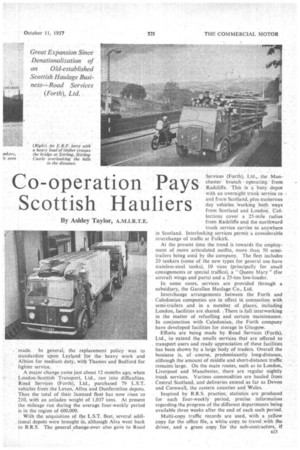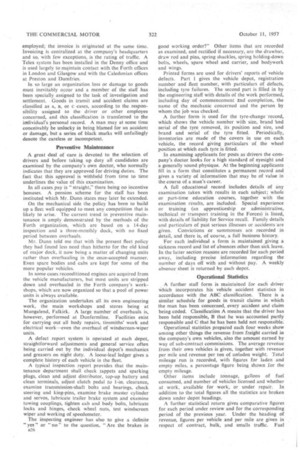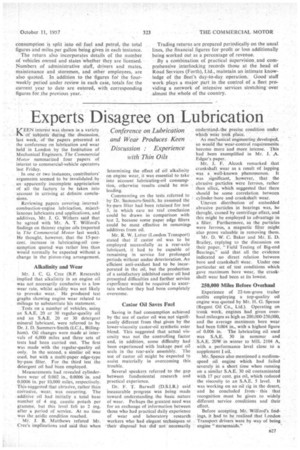Co-operation Pays Scottish Hauliers
Page 59

Page 60

Page 61

If you've noticed an error in this article please click here to report it so we can fix it.
By Ashley Taylor, A.M.I.R.T.E. Services (Forth), Ltd., the Manchester branch operating.from Radcliffe. This is a buy;. depot with an 'overnight trunk.service to and from Scotland, plus numerous day vehicles Working .both ways from Scotland and London.. Collections cover a 25-mile radius from Radcliffe and the northward trunk service carries to anywhere
in Scotland. Interlocking services permit a considerable interchange of traffic at Falkirk.
At the present time the trend is towards the employment of more articulated outfits, more than 50 .semitrailers being used by the company. The fleet includes 20' tankers(some of the new types for general use have stainless-steel tanks), 10 v-ans (principally for small consignments or special traffics), a "Queen Mary " (for aircraft wings and parts) and a 25-ton low-loader.
In some cases, services are provided through a subsidiary, the Garallan Haulage Co., Ltd.
Interchange arrangements . between the Forth and
• Caledonian companies are in effect in connection with . semi-trailers and in a number of places, including London, facilities are shared. .There is full interworking in the matter of refuelling and certain maintenance.
• In conjunction with Caledonian, the Forth company have developed facilities for storage in Glasgow. Efforts are being made by Road Services (Forth), • Ltd., to extend the smalls services that are "offered to . transport users and ready appreciation of these facilities has been shown by a large body of traders. Overall the business is, of course, predominantly long-distance, although the amount of middle and short-distance traffic remains large. On the main routes, such as to London, Liverpool and Manchester, there are regular nightly trunk services. Various CommaditieS are hauled from Central Scotland, and deliveries extend as far as Devon and Cornwall, the eastern counties and Wales.
• Inspired by B.R.S. practice; statistics are produced for each four-weekly period, precise information regarding the progress of the different departments being available three weeks after the end of each such period. Multi-copy traffic records are used, with a yellow copy for the office file, a white copy, to travel with the driver, and a green copy for the sub-contractors, if employed; the invoice is originated At the same time. Invoicing is centralized at the company's headquarters and so, with few exceptions, is the rating of traffic. A Telex system has been installed in the Denny office and is used largely to maintain contact with the Forth offices in London'and Glasgow and with the Caledonian offices at Preston and Dumfries.
In so large an organization loss or damage to goods must inevitably occur and a member of the staff has been specially assigned to the task •of investigation and settlement. Goods in transit and accident claims are classified as A, B, or c cases, according to the responsibility assigned to the driver or other employee concerned, and this classification is transferred to the inalividuats personal record. A man may at some time conceivably be unlucky in being blamed for an accident or damage, but a series of black marks will unfailingly denote the careless or incompetent.
Preventive Maintenance A great deal of care is devoted to the selection of drivers and before taking up duty all candidates are titan-fined by the company's own doctor, who normally indicates that they are approved for driving duties. The fact that this approval is withheld from time to time underlines the value of this examination.
In all cases pay is "straight," there being no incentive bonuses. A pension scheme for the staff has been instituted which Mr. Dunn states may later be extended.
On the mechanical side the policy has been to build up a fleet well equipped to meet any competition that is likely to arise. The current trend in preventive maintenance is amply demonstrated by the methods of the Forth organization, which are based on a 14-day inspection and a three-monthly dock, with no fixed period between overhauls.
Mr. Dunn told me that with the present fleet policy they had found less need than hitherto for the old kind of major dock, it now being a matter of changing units rather than overhauling in the once-accepted manner. Even spare bodies and cabs are kept for some of the more popular vehicles.
In some cases reconditioned engines are acquired from the vehicle manufacturers, but most units are stripped down and overhauled in the Forth company's workshops, which are now organized so that a pool of power Units is always available.
The organization undertakes all its own engineering work, the main workshops and stores being at Mungalend, Falkirk. A large number of overhauls is, however, performed at Dunfermline. Facilities exist for carrying out all body repairs, tinsmiths' work and electrical work—even the overhaul of windscreen-wiper units.
A defect report system is operated at each depot, straightforward adjustments and general service often being carried out •by the individual depot's mechanics and greasers on night duty. A loose-leaf ledger gives a complete history of each vehicle in the fleet A typical inspection report provides that the maintenance department shall check tappets and sparking plugs, clean and adjust distributor, top-up battery and clean terminals, adjust clutch pedal to 1-in, clearance, examine transmission-shaft bolts and bearings, check steering and king-pins, examine brake master cylinder and servos, lubricate trailer brake system and examine towing couplings, tighten cab and body bolts, lubricate locks and hinges, check wheel nuts, test windscreen wiper and working of speedometer.
The inspecting engineer has also to give a definite "yes." or "no" to the question, "Are the brakes in good working order?" Other items that are recorded as examined, and rectified if necessary, are the drawbar, draw rod and pins, spring shackles, spring holding-down bolts, wheels, spare wheel and carrier, and bodywork and wings.
Printed forms are used for drivers' reports of vehicle defects. Part 1 gives the vehicle depot, registration number and fleet number, with particulars of defects, including tyre failures. The second part is filled in by the engineering staff with details of the work performed, including day of commencement and completion, the name of the mechanic concerned and the person by whom the job was checked.
A further form is used for the tyre-change record, which shows the vehicle number with size, brand "and serial of the tyre removed, its position and size, and brand and serial of the tyre fitted. Periodically, inventories are made of the covers in use on each vehicle, the record giving particulars of the wheel position at which each tyre is fitted.
In examining applicants for posts as 'drivers the company's doctor looks for a high standard of eyesight and a generally sound physique. At the beginning applicants fill in a form that constitutes a permanent record and gives a variety of information that may be of value in the course of a man's career.
A full educational record includes details of any examination taken with results in each subject; whole or part-time education courses, together with the examination results, are included. Special experience or training (an apprenticeship or administrative, technical or transport training in the Forces) is listed, with details of liability for Service recall. Family details and particulars of past serious illnesses or accidents are given. Convictions or summonses are recorded in detail, and there is, of course, a full business history.
For each individual a form is maintained giving a sickness record and list of absences other than sick leave. In the latter section reasons are recorded for each period away, including precise information regarding the number of days off with and without pay. A weekly absence sheet is returned by each depot.
Operational Statistics
A further staff form is maintained for each driver which incorporates his vehicle accident statistics in accordance with the ABC classification. There is a similar schedule for goods in transit claims in which the man has been concerned, every accident and claim being coded. Classification A means that the driver has been held responsible, B that he was accounted partly responsible and C that he has been held not responsible.
Operational statistics prepared each four weeks show among other things the revenue from freight carried in the company's own vehicles, also the amount earned by way of sub-contract commissions. The average revenue from their own vehicles is given, together with revenue per mile and revenue per ton of unladen weight. Total mileage run is recorded, with figures for laden and empty miles, a percentage figure being shown for the empty mileage.
Other items include tonnage, gallons of fuel consumed, and number of vehicles licensed and whether at work, available for work, or under repair. In addition to the total figures all the statistics are broken down under depot headings.
A further statistical return gives comparative figures for each period under review and for the corresponding period of the previous year. Under the heading of revenue, figures per vehicle and per mile are given in respect of contract, bulk, and smalls traffic. Fuel
consumption is split into oilfuel and petrol, the total figures and miles per gallon being given in each 'instance.
The return also incorporates details of the number Of vehicles owned and states whe,ther they are licensed. Numbers of administrative staff, drivers and mates, maintenance and storemen, and other employees, are also quoted. In . addition to the figures for _the fourweekly period under review in each case, totals .for, th.e current. year to date are entered, with corresponding figures. for the previous year.
Trading returns are prepared periodically on the usual lines, the financial figures for profit or loss additionally ,being worked out as a percentage of revenue.
By a combination of practical gupervision, and comprehensive interlocking records those at the head Of Road Set vices (Forth), Ltd., maintain an intimate knowledge of the fleet's day-to-day. operation. Good -staff work • plays a major part in .the control of a fleet providing a network of intensive services stretching over .almost the whole of the country. •




















































































































